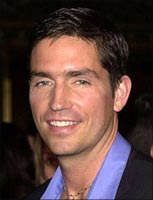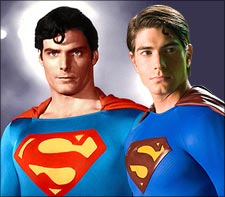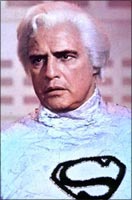Superman Returns has been in the making, and making, and making, for a little over ten years, during which time directors came and went; scriptwriters came, wrote, and were junked.
When finally it was all systems go, Warner Bros was so wary about news leaking out prematurely, the project was covered by a fake working title -- Red Sun.
Even promo materials sent out by Warner Bros to the UK and other international destinations recently, after the film was complete, went out in packages labeled 'Red Sun'.
The budget for Superman: The Movie, which kick-started the superhero's on-screen career in the late 1970s, was $55 million (even then, the credits sequence alone cost more than the total budget of most movies of the time).
The official budget for this year's Superman Returns is $184,500,000 (the buzz is the amount is over $200 million) -- considerably more than the total gross for Superman II, which produced $108,200,000 at the box office.
Before Richard Donner got the opportunity to direct the original Superman, many were contacted for the job -- among them, a chap named Steven Spielberg.
Warner Bros, however, decided to wait and watch how the director's 'fish movie' would do at the box office.
Jaws, the movie in question, grossed $470, 600,000 worldwide -- more than the total grosses of Superman and Superman II combined ($408,400,000).
By the time Jaws snowballed into a runaway hit and the studio actively sought out Spielberg, the director had been flooded with offers, and had no time.
The number of actors considered for the original Superman is legendary.
One among them was Patrick Wayne -- who dropped out because his father, the star John Wayne, had by then been diagnosed with cancer.
Others who tested for the part include Paul Newman, Robert Redford, Arnold Schwarzenegger, Charles Bronson and Kris Kristofferson.
Elsewhere Sylvester Stallone, fresh off the success of Rocky, was so intent on the part he lobbied intensely for the lead role.
And Olympic gold medalist (decathlon) Bruce Jenner tried out for the role too, only to pull out so he could shoot for the video of the Village People hit Can't Stop the Music.
Redford, incidentally, turned the role down because the money wasn't good enough;
Eastwood was too busy and another big name actor of the time, James Caan, said, 'No way I'll get into a silly suit'.
Also looked at were Warren Beatty, Burt Reynolds, and Jon Voight.
While on that, actors considered for the lead role in Superman Returns, before director Bryan Singer took over the project from Brett Ratner, include Josh Hartnett, Mathew Bomer, Brendan Fraser, Ashton Kutcher, David Boreanz, Henry Cavill and Paul Walker.
 James Caviezel (right) was keen on the role, but Singer shot him down on the grounds that Passion of the Christ had made him too well known, and that the star would overshadow the character.
James Caviezel (right) was keen on the role, but Singer shot him down on the grounds that Passion of the Christ had made him too well known, and that the star would overshadow the character.
Anthony Hopkins was considered for Jor-El in Superman Returns, but opted out when Ratner was replaced by Singer.
Johnny Depp was similarly considered for the villain Lex Luthor's part before Singer came on and took the role to Kevin Spacey.
Singer, incidentally, originally intended to recreate the character of General Zod, from Superman II, in his film and wanted Jude Law to play the character.
When Law bailed out, citing scheduling conflicts, Singer eliminated the character from the script.
Again, before Kate Bosworth got the role of Lois Lane, the likes of Mischa Barton and Keira Knightley were considered for the role, as were Elisha Cuthbert, Claire Danes and Keri Russell.
And while on Lois, the character herself is a nod to Superman creator Jerry Siegel's first crush.
While a student, Siegal carried a torch for a fellow student called Lois Amster, whose personality and looks contributed to the way Lois Lane developed in the early comics.
'Siegel just used to stare at me, he was a very strange guy,' Amstel said in an interview a couple of decades later -- sort of like Clark and Lois in the strip, and in the movie.
Meet the desi Superman villain
More on character origins: The look of Clark Kent, as originally conceived in the comics and the film, was patterned on a photograph sent to Siegel in 1930.
The photo was of Walter Dennis, a square jawed, blue-eyed, spectacles-wearing science fiction fan and newspaperman.
Metropolis, the fictional city the Superman stories are set in, is widely believed to be New York City, and it is no secret the city's skyline has been extensively used in the movie.
Contrary to popular belief though, it was not New York City that inspired the comic creation Metropolis -- it was Toronto, Superman co-creator Joe Siegel's home town.
Incidentally, Siegel gave a little bit of himself to the Superman mythology -- in his younger years, Siegel had worked as a newspaper boy, selling Toronto's Daily Star.
When it came time to create Superman, Siegel gave him a promotion to newspaper reporter, but retained Daily Star as the paper before it was later changed to Daily Planet.
While on Superman and New York City, the Man of Steel made an appearance in the metropolis in 1940 when a gigantic balloon in his likeness was the star of the Macy's Thanksgiving Day Parade of that year.
Superman's popularity grew, and so did the size of the balloon -- by the time he made his last appearance in the parade, in 1987, he measured 104 feet by 35 feet, and it took 14,000 cubic feet of helium to blow him up to his full size.
Those who have shown up in Superman comics include, besides other superheroes like Batman and Spiderman, real-life icons like director Orson Welles and President John F Kennedy.
But the most applauded appearance was that of Muhammad Ali, in a 1978 comic put out by DC Comics.
Writer Denny O'Neil and artist Neil Adams interviewed the legendary boxer in a hotel in New York state's Catskills area, and came up with a story of alien invaders who challenge the earth to pit its best fighter against their champion.
Superman and Ali both volunteer and decide to fight each other for the honour.
Superman trains under a red sun that saps his special powers and is clearly out-fought by Ali when the two meet in the ring.
Come the big night, and the two team up -- Ali stalls for time in the ring while Superman defeats the aliens' plan to attack Metropolis while everyone is distracted watching the fight.
Superman comics have spawned far more than Superman movies and memorabilia.
For instance, there is Superman #9, a full length comic that came out in September 1987.
In the opening sequences, Lex Luthor enters a diner en route to Metropolis, spots a pretty young actress named Jenny, and offers her one million dollars to spend one month with him -- a plot that famously became a full length feature film named Indecent Proposal.
Incidentally, in the strip, Luthor is merely having Jenny on -- he tells her he will wait outside for ten minutes, for her answer. Jenny ponders the possibilities, her friends egg her on to accept the offer.
She finally makes up her mind to, and goes out -- only to find that Luthor has already driven away, deliberately leaving her dangling -- just a little mind game to while away a passing moment.
When Brandon Routh was being considered for the lead role in Superman Returns, director Bryan Singer set up an exploratory meeting with him in a coffee shop -- and almost the first thing a nervous Routh did was spill coffee all over the table, dumping a generous portion in the director's lap.
The actor thought he had blown it; as it happened, though, Singer laughed and figured that was just the kind of bumbling Clark Kent would do, and that helped make up the director's mind that Routh was right for the role.
 It is blindingly obvious, from the first frame of Superman Returns, that Routh has drawn heavily on Christopher Reeve for his own portrayal of Superman and Clark Kent.
It is blindingly obvious, from the first frame of Superman Returns, that Routh has drawn heavily on Christopher Reeve for his own portrayal of Superman and Clark Kent.
Reeve himself, while planning how he would play Clark Kent, took large doses of inspiration from Cary Grant, who played Dr David Huxley in the 1938 movie Bringing Up Baby, opposite Katherine Hepburn.
And speaking of people from the past popping up in the present, director Singer nearly nailed the ultimate coup: his intent was to get Christopher Reeve to make a cameo appearance in Superman Returns, but the actor died before the shooting had really gotten off the ground.
The battle of the box office -- between Singer's Superman, Christopher Nolan's Batman and Sam Raimi's Spiderman -- will play out over time, but this year's MTV Awards, at the Kodak Theatre in Los Angeles June 3, had a moment analysts will reference repeatedly as the superheroes play out their box office battle.
That came when Christian Bale was called on stage to receive the Best Hero award for his role in Batman Begins -- waiting on stage to greet the Dark Knight was Brandon Routh.
As an unknown actor with just one movie and one television soap to his name at the time, it was unlikely that Christopher Reeve would get top billing ahead of Marlon Brando and Gene Hackman.
Curiously, though, despite becoming an instant icon when the movie was released, and despite Brando dropping out of the sequel and Hackman not even once setting foot on the sets for any actual filming, Reeve still didn't get top billing in the sequel. Hackman topped him in the credits, and it was only in Superman III, once both Hackman and Brando were out of the project, that Superman finally became Superman in the credits, too.
Remember that Superman first flew when special effects was in its infancy -- back in the mid-1970s, the filmmakers had the devil's own work trying to get the Man of Steel off the ground.
They tried using a catapult to toss a dummy into the air; they tried a remote controlled airplane painted to look like Superman, an early television version even had the actor jumping over the camera to stimulate flight.
Finally, for the 1978 film, they settled on zooming in on the actor while gradually receding the visual on a back projection screen.
And just incidentally, for the shot of young Superman kicking a football into the stratosphere, they buried an air cannon underground, and shot the ball out of it.
Filming was on for Superman: The Movie in New York in July 1977, when the city experienced an infamous blackout that Time magazine called 'Night of Terror'.
The joke was that the camera crew on Superman thought, for quite a while, that they had triggered it by plugging equipment into an already overloaded connection.
In the original Superman, Lois Lane meets Superman for the first time when he saves her from a helicopter teetering on the roof of the Daily Planet building.
The screenplay called merely for Superman to save Lois -- but then, director Richard Donner decided to convert it into what he called a Double Jeopardy scene, by having the helicopter crash down as well, forcing Superman to stop it from smashing into the people below.
That one sequence, incidentally, took 12 months to shoot, with Donner insisting he had to get it exactly right. Such Double Jeopardy scenes have since become the staple of superhero movies, including Sam Raimi's interpretation of Spiderman.
Donner, incidentally, had the word Verisimilitude printed in large letters and put up all over his sets; the idea, he kept repeating, is not to try for reality, but just to be real, true to the story and situation.
Donner wasn't above using tricks to get his actors to do what he wanted them to.
Gene Hackman, for instance, refused to shave off his moustache for the role of Lex Luthor. Donner got the star on the phone and told him if he would shave, so would Donner. Hackman took the bait -- and only later, when the two met for the first time on the sets, did he realise the director didn't have a moustache to start with.
 Marlon Brando's casting was easily the most troublesome part of the movie.
Marlon Brando's casting was easily the most troublesome part of the movie.
Firstly, for an appearance that lasted less than 10 minutes of screen time, the star (right) demanded and got $4 million, a huge paycheck in those days.
He then argued that the scenes of him talking to his wife, and then his son, before sending the latter off to earth in a spaceship could be shot with him merely voicing it, while he was represented by a floating, gleaming, green bagel.
Not content with all of that, once the movie proved a hit, Brando sued for and won a percentage of the profits as well, and even got a portion of the profits of the sequel even though he never appeared in it.
Still on Brando: Richard Donner had shot tons of excess footage he intended to use in Superman II. Some of it was used by Richard Lester, who replaced Donner at the helm of the sequel; a lot of it was junked.
There was a scene planned, where the adult Superman talks to and receives instructions from his father in the Fortress of Solitude -- this bit, filmed on Brando for the sequel, was tanked when the actor demanded that he be paid a salary, and a share of the profits, for that film too.
That footage, in the cans for the past 28 years and more, has now been revived, and used in Superman Returns.
Incidentally, Margot Kidder, who played Lois Lane in the first three Superman movies, was so upset with the axing of Donner for the sequel, she voiced her protest in pretty strong terms to the studio. The only result of the protest was that the studio promptly cut her role, in Superman III, to a mere five minutes of screen time.
And while on Donner shooting extra footage, all the Gene Hackman scenes in the sequel were those shot by Donner while doing the first film -- Hackman never set foot on the set of Superman II, even though he is listed at the top of the credits, over Reeve.
The very few scenes that required to be shot specially for the sequel used a body double for the star.





